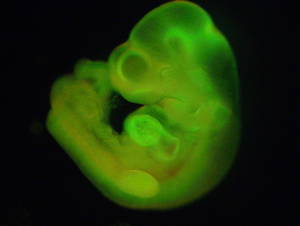Cells can be switched back into a stem-cell like state by giving them a brief shock with acid, Japanese scientists have  shown.
shown.
Previously, Nobel Prize-winner Shinya Yamanaka had found that adding four specific molecules to cells could reprogramme them.
Now, for the first time, writing in the journal Nature, they've shown that a physical shock - like acid - can switch cells into a stem cell state.
So it's fascinating and potentially very important for future stem cell therapies, not to mention a little bit controversial as it sounds almost too good to be true.
To make their discovery, the researchers took white blood cells from a mouse spleen, and gave them a 25 minute dip in acid at pH 5.7 - normal body pH is around 7.4.
They then grew the shocked cells in the lab and found that they took on the characteristics of stem cells.
The team found they could push these reprogrammed cells into making different kinds of tissue found in the early embryo. They also showed that other types of cells, including nerve cells, skin, muscle fat and bone could also be reprogrammed with an acid dip.
In further experiments, the researchers showed that their acid-induced stem cells could make up tissues in both a mouse embryo and the placenta. This is very unusual, as regular embryonic stem cells can only contribute to the embryo, and not to placenta.
It's easy to imagine that this kind of reprogramming could have huge implications for making stem cells for uses such as growing replacement organs - and certainly the headline writers have been very excited.
But there are a lot of questions. Firstly, this is just from one lab, so the remarkable findings need to be reproduced by other teams. Also, we don't know if it will work in human cells, or if adult cells can be reprogrammed in this way - something that would be most useful for medical applications.
Any stem cells generated by the acid bath method would still have to undergo extremely rigorous testing to make sure they stick to what they're meant to be doing and don't become cancerous.
It's also not clear how 'normal' they are in terms of the molecular markers that control gene activity, known as epigenetic marks. And there's a bigger question about how it works and why, for example, cells in the very acidic environment of the stomach don't get reprogrammed.
References
- Previous Hacking into the Beijing cough
- Next Purple Tomatoes










Comments
Add a comment